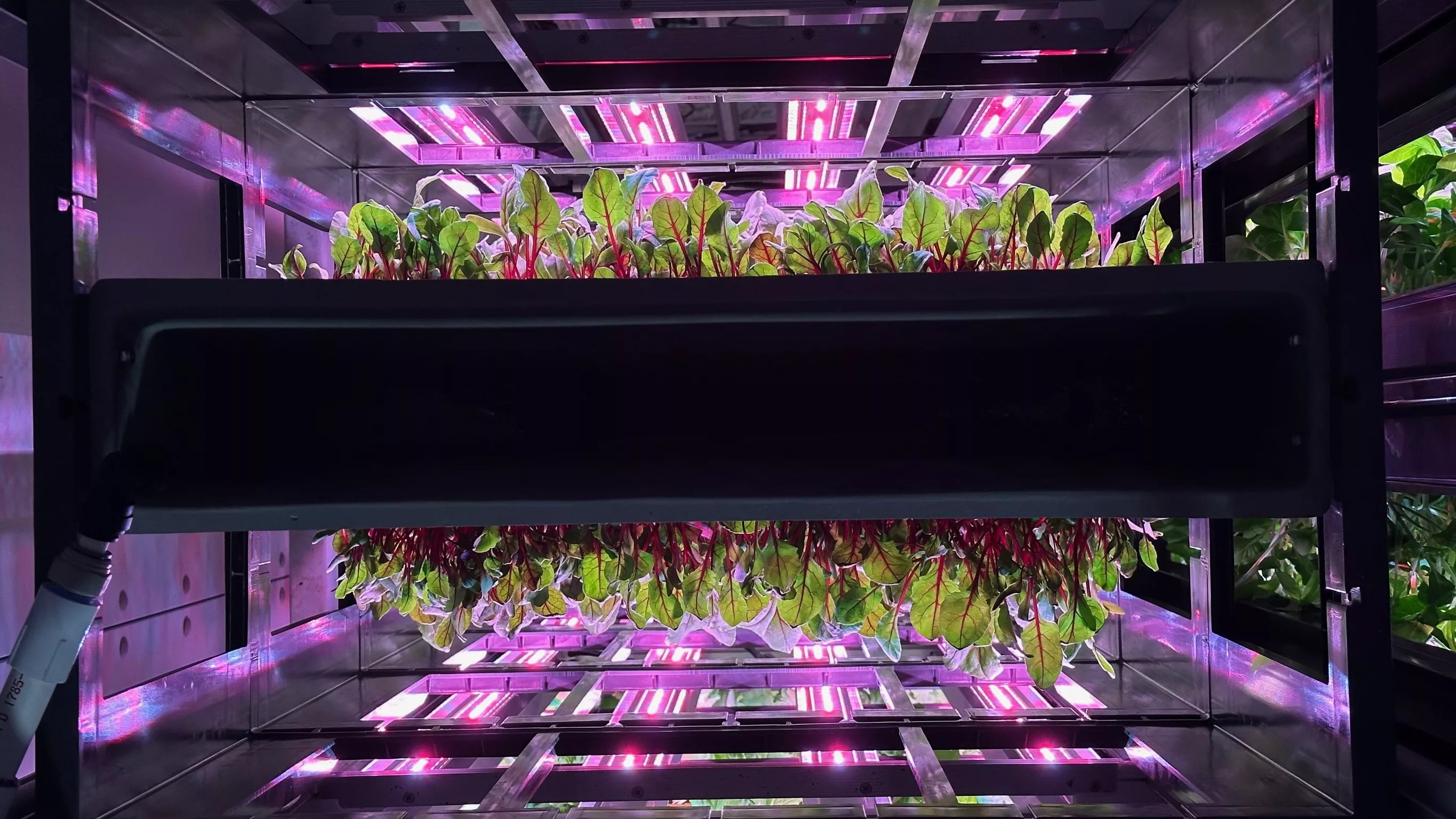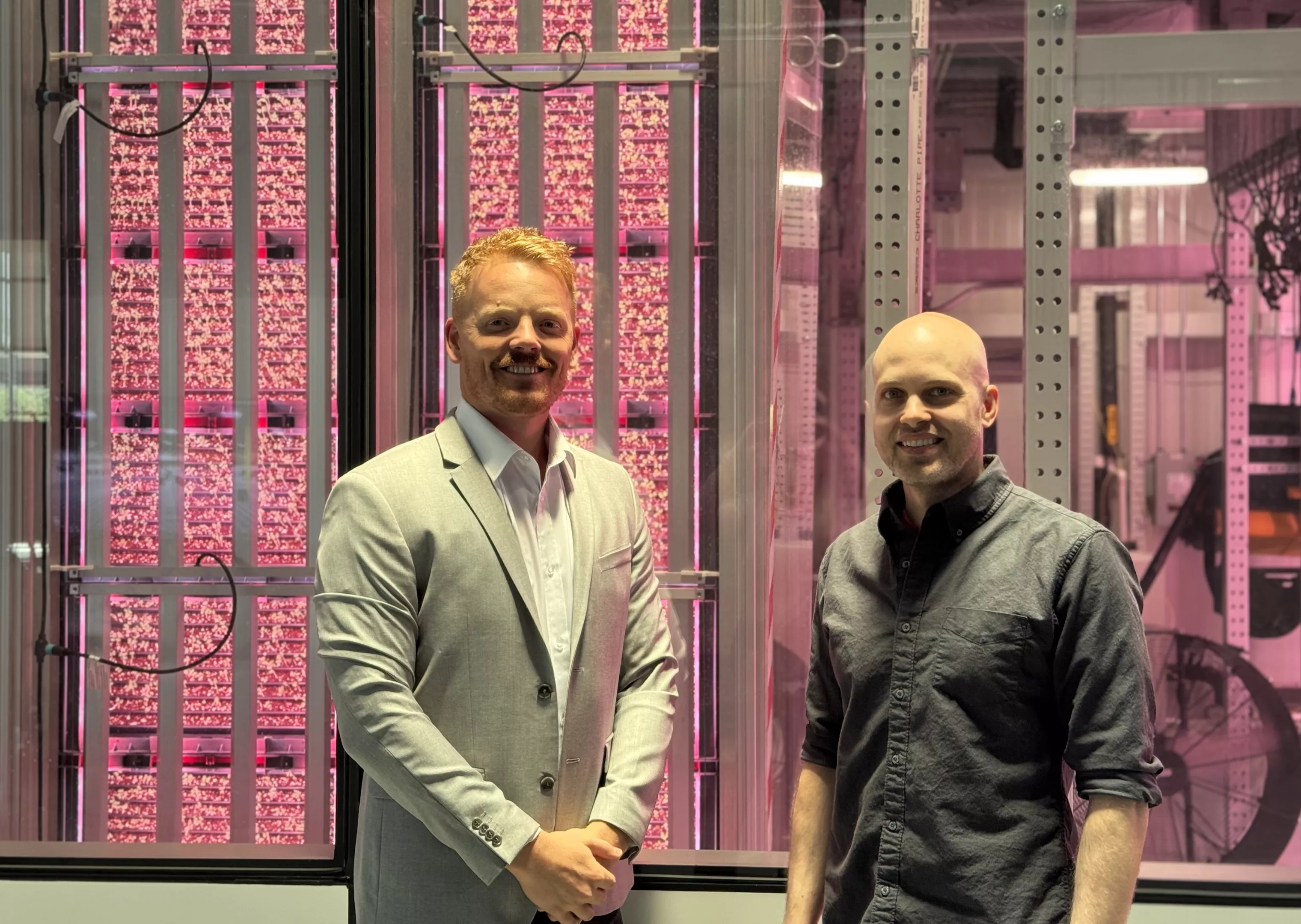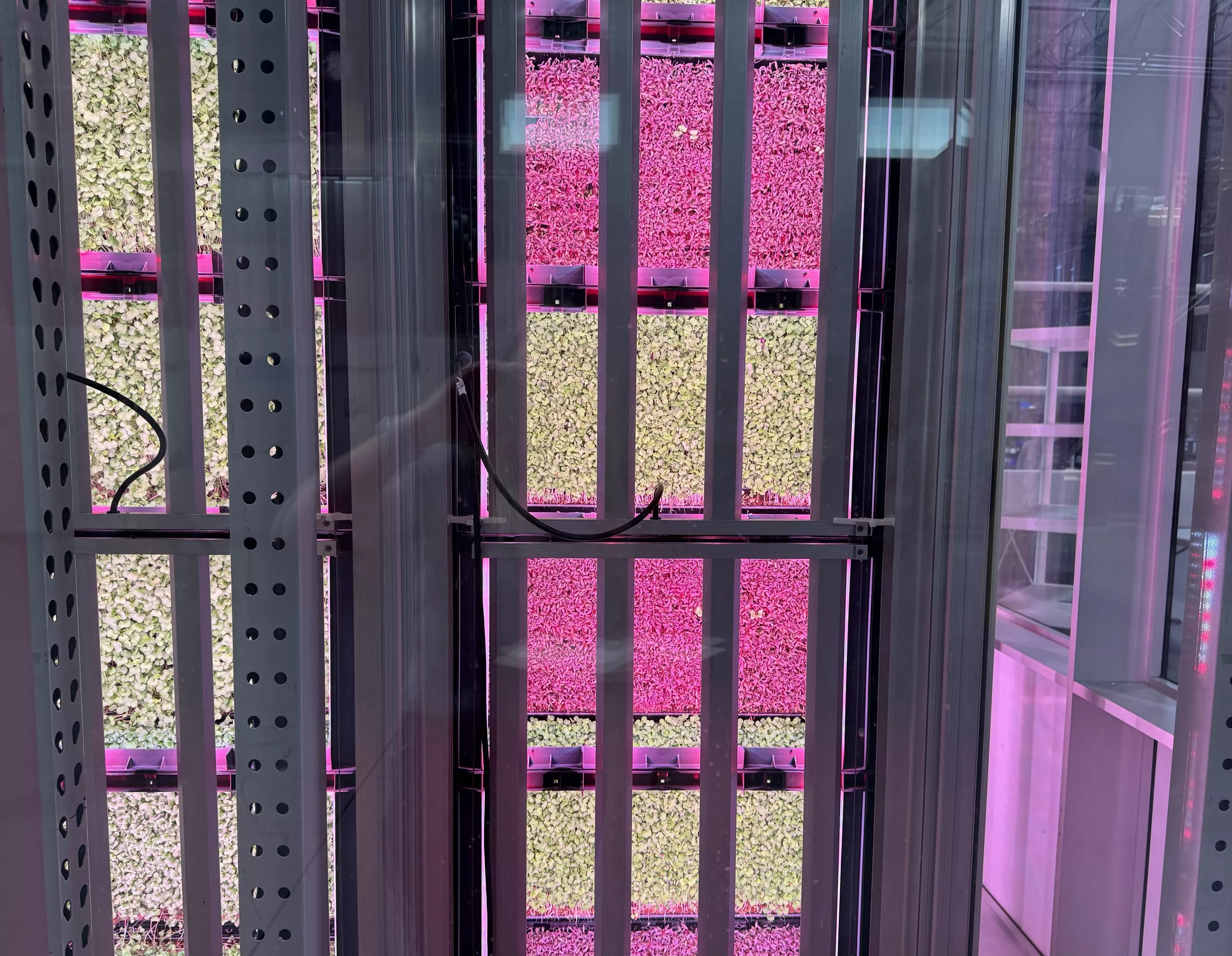
OnePointOne

Audio By Carbonatix
Picture a farm in Avondale growing leafy greens. Maybe you’ve imagined small plants swaying in the breeze alongside the road. But at one West Valley farm, the plants have never seen the sun.
These vegetables are germinated and raised in a pilot vertical farm built by the ag tech startup OnePointOne and the Norwegian warehouse automation company AutoStore.
Called the Opollo Farm, this futuristic agriculture project is encased behind glass. It’s about 1,000 square feet and towers upward for multiple stories. Inside, the temperature and atmosphere are regulated. Greens and herbs in varying stages of growth are arranged in neat rows, stretching outward from some 1,000 bins holding them in place in this matrix.
A warm, electric pink hue casts over the space from a combination of red, white and blue LED lights that stimulate photosynthesis. At the top of this cubic, stacked farm, there are two stout, square robots. These automated farmhands soundlessly slide around, helping their human colleagues with watering schedules and moving plants.
Will you step up to support New Times this year?
We’re aiming to raise $30,000 by December 31, so we can continue covering what matters most to you. If New Times matters to you, please take action and contribute today, so when news happens, our reporters can be there.
“When you’re growing plants in space, it’s going to look a lot like this,” says Benjamin Warden, AutoStore’s director of product management.
Here on Earth, Valley shoppers can taste these robot-grown greens at Whole Foods. They landed on shelves in early May under the brand name Willo Farm. Options include five-ounce packages of certified-organic, non-GMO baby kale, baby bok choy, baby mizuna and spring mix, each sold for $4.49.
“We are not the most expensive stuff on the shelf. Our whole goal as a business is to feed everybody,” says OnePointOne CEO Sam Bertram. “Eventually, we want these in essentially every retail store around the United States.”

OnePointOne CEO Sam Bertram and AutoStore Product Management Director Benjamin Warden.
Sara Crocker
How does Opollo Farm work?
The greens are the first of several varieties of leafy vegetables, herbs, berries and mushrooms that Bertram says they want to produce.
Grown in a controlled environment with adjustable temperature, humidity and atmospheric carbon dioxide levels, most plants are ready for harvest within 15 to 17 days, he says. The growers don’t use pesticides, not only because it’s healthier for you, but simply because no bugs can get in.
Bertram, originally from Australia, founded OnePointOne with his brother John in San Jose in 2017. The duo aims to address malnutrition and support the environment by making fresh food more accessible in urban areas year-round without using a lot of water or land.
“I love ag, I love farming, but agriculture is an absolute miracle,” Bertram says. “A lot of these resources are finite.”
Vertical farming uses a fraction of those resources. With its current 1,000-square-foot farm, OnePointOne is “unbelievably productive,” Bertram says, producing about 4,000 pounds of produce a month while using about 95% less water than conventional farming. That’s possible because of its hydroponic system, where water is recirculated, according to the company.
While saving water in an increasingly hot and dry world is a positive, these types of farms require another resource: electricity.
Vertical farms use 99% more energy than outdoor farms and 86% more than greenhouses, according to a 2021 industry report.
Bertram acknowledges this demand and notes that vertical farming isn’t a “panacea” to fix the food system.
“To be quite frank with you, that is one of the hard parts of vertical farming, one of the negative parts of vertical farming, is we require a lot of electricity,” he says.
OnePoinOne is not currently tracking its carbon emissions related to energy usage. However, Bertram says they have worked to use the most efficient LED lighting and heating and cooling systems available.
“The resources we are looking to conserve are much more around land and water,” he says.
The company relocated to Arizona in 2021. One of the benefits of moving here is the lower cost of business, Bertram explains, noting the price of electricity. The company pays 8 cents per kilowatt hour here compared to 25 cents per kilowatt hour in California, he says.
Designing the farm to maximize its density “gives you a lot of gains” on energy usage, too, Warden adds.

A combination of red, white and blue LED lights creates a pink hue over the matrix of greens growing inside Opollo Farm.
Sara Crocker
Pilot farm has potential for ‘vast scale’
Over the next decade, Bertram envisions placing smaller versions of the farm inside existing grocery distribution centers, allowing retailers to grow and package produce at the same place where they store other goods.
“(Produce) doesn’t need to travel 2,000 miles anymore,” he says. “It needs to travel two meters into the cold storage.”
Bertram says expanding is possible because of their partnership with AutoStore. The automation company’s stacked storage system and robots are the foundation of the Opollo Farm. The group will also make use of artificial intelligence to help humans maintain and diagnose issues with plants.
“It’s going to be a collaboration between people and robots,” Bertram says. “It’s just a phenomenal tool to make people more powerful, focusing in the areas that they’re most productive.”
In addition to expanding the farm, Bertram also wants to partner with other growers, offering research and cultivating seedlings at Opollo Farm that can be transplanted to a greenhouse or outdoors to help traditional farms get higher yields. A loftier goal is to use the farm system for growing biopharmaceuticals, or plants whose compounds can be used in medicines.
After eight years of work, relocating their company and piloting the Opollo Farm, Bertram says OnePointOne is at an inflection point. AutoStore’s Warden agrees, saying his organization sees potential for these farms on a “vast scale.”
“Where we go next is anyone’s guess,” he says.
“Literally Mars,” Bertram quips.